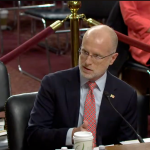
The orange glow of the sun rises on a hidden gem, a stretch of greenspace no larger than a quaint parking lot on the westside of Atlanta.
A fragrance of freshly cut grass fills the air as the sharp, yet stochastic sound of aged shovels heaving compost is overpowered by the laughter of elementary school children. Elderly adult chaperones carefully pass on the knowledge of how to tend rows of herbs, vegetables and fruit. One child, Amara (or affectionately, “Ra-Ra”), can no longer contain her excitement. “This the one y’all! Watch me bank off this one!” The nine-year-old pulls and tugs at a stubborn baby peach tree.
To read a version of this story in Spanish click here. Haz clic aquí para leer este reportaje en español.
Sharp as a tack, reading at a middle school level and possessing the cutest “southern drawl” accent, Ra-Ra is also training to become a junior master gardener at the Mother Clyde Memorial West End Garden. Her project is tending to peach trees. I taught Ra-Ra, much like my elders taught me, everything from sowing the seeds to nurturing the trees. As a master gardener, I oversee our fruit orchard where apples, pears and our cherished Georgia peaches thrive. However, the true pièce de résistance lies in the kitchen, where we reap the rewards of our labor. I take great pleasure in offering culinary tutorials to the community featuring ingredients sourced directly from our garden. Ra-Ra has become renowned for her coveted creation, Ra-Ra’s Peach Chutney, a treat that can be savored at the West End Farmer’s Market.
This snapshot differs from what the community experienced a few years prior.
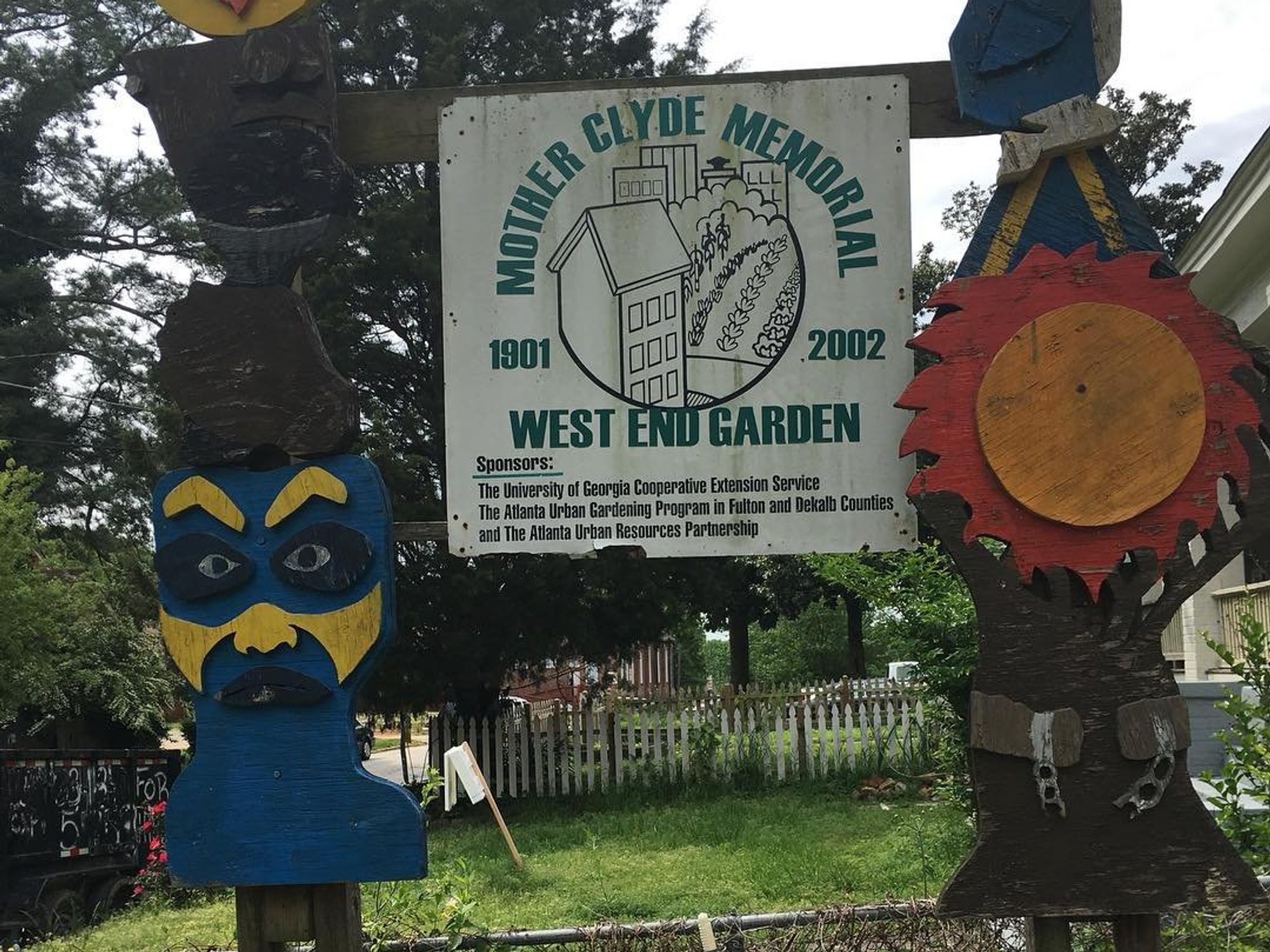
Located in Atlanta Police Department’s Zone 4 Precinct, this community historically experienced higher crime rates due to poverty and systemic exclusion. During the 1980s and 1990s, the greenspace where peaches grow today was an area with significant drug activity, limited access to fresh food and a high incidence of crime and sex work. The situation worsened the historical relationship with law enforcement, already marked by tension and conflict. The crime ridden status of Zone 4 deflected whatever interest businesses had to set up locations, including grocery stores.
The Mother Clyde Memorial West End Garden faced numerous challenges that could have led to its failure, including limited land access, financial constraints, infrastructure limitations, zoning and regulatory obstacles, lack of community upport, and limited technical knowledge and training. However, this urban farm goes beyond traditional food production by integrating sustainable agriculture with education, job training, entrepreneurship and community development. By providing access to fresh and nutritious foods while also fostering agribusiness, the garden offers concrete solutions to combat environmental injustices. It serves as a model of positivity and hope in an area plagued by food deserts.
The garden’s impact extends beyond agriculture. By utilizing community-based approaches similar to those employed in the garden, we can address various aspects of life in Zone 4. This includes fostering connections between law enforcement and the community. The garden has the potential to sow new relationships between the police and residents while promoting understanding and collaboration.
The Mother Clyde Memorial West End Garden not only tackles food insecurity but also acts as a catalyst for skill building, connection, health improvement and overall community development. By highlighting its success in combating food deserts and nurturing positive relationships within Zone 4, we can truly capture the essence of this initiative.
Food apartheid: the force behind food deserts
Growing up, I had a deep curiosity for cooking and exploring the diverse cultural influences from the places I lived. In Nigeria, where I spent my early years, farming was a way of life. Access to fresh food was dependent on the harvest in our village and trips to local markets in nearby cities. This connection sparked my interest in understanding where food comes from.
When I moved to the U.S. in the early 90’s, particularly in urban areas, I noticed that access to fresh and nutritious foods became more challenging. Many neighborhoods lacked grocery stores or farmers’ markets with affordable options. Ultimately landing in Compton, California, this limited access made it difficult to maintain a healthy diet and incorporate culturally significant foods.
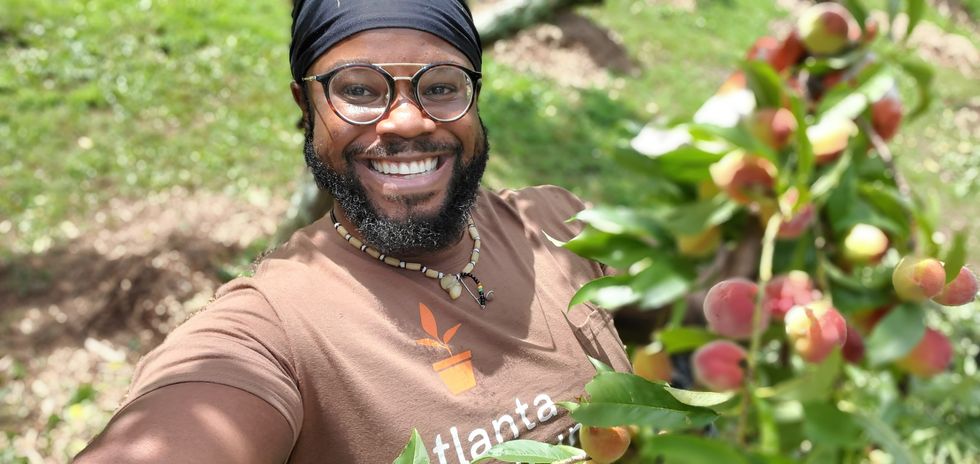
During my undergraduate studies at UC Berkeley, I came across the term “food desert,” a place where most people live a mile or more away from the nearest supermarket; or have limited access to healthy, affordable food due to income, location or transportation. But unlike real deserts, food deserts are not naturally occurring: they are the result of neglect. That’s where the idea of food apartheid comes from.
Atlanta’s Zone 4 is a perfect example. The barriers to healthy and fresh food can be explained not by a community’s lack of initiative but by a continued legacy of structures, policies and limited resources.
When rapid urbanization and industrialization led to the displacement of many rural communities outside Atlanta in the early 20th century, neighborhoods quickly sprouted and industries flourished.
Once vibrant agricultural lands were now concrete jungles. In certain neighborhoods, like Zone 4, families struggled to find fresh fruits and vegetables within walking distance. Lower income residents became at the mercy of fast-food chains and convenience stores, which offered limited healthy food, but at a bargain price. This process sped up in the mid-20th century, when middle-class whites and Blacks left for the suburbs. Supermarkets and fresh markets followed, leaving communities in south and southwest Atlanta behind. As food deserts grew, the problem was ignored, silently affecting the health and well-being of countless Atlantans.
The consequences are dire: the 2023 Fresh Produce Access Report by Emory University found only 36% of stores in majority-Black neighborhoods in Atlanta carried fresh produce compared to 61% in non-majority-Black neighborhoods. About 20% of Black households can’t access food reliably in Atlanta. They are part of the 44.2 million Americans who have difficulty feeding their families, according to the latest data from Emory University. Of this population, 13 million are children like Ra-Ra.
In our city, food deserts tend to occur in areas that were previously red-lined, which means they are an indirect result of Jim Crow’s era of racial segregation. They have been systematically impoverished, which led to an uptick of violent crime in these areas in the 1990s. That era’s policies to combat crime only increased widespread racial profiling, harassment and violence at the hands of law enforcement.
Reclaiming our time with REDEEMED communities
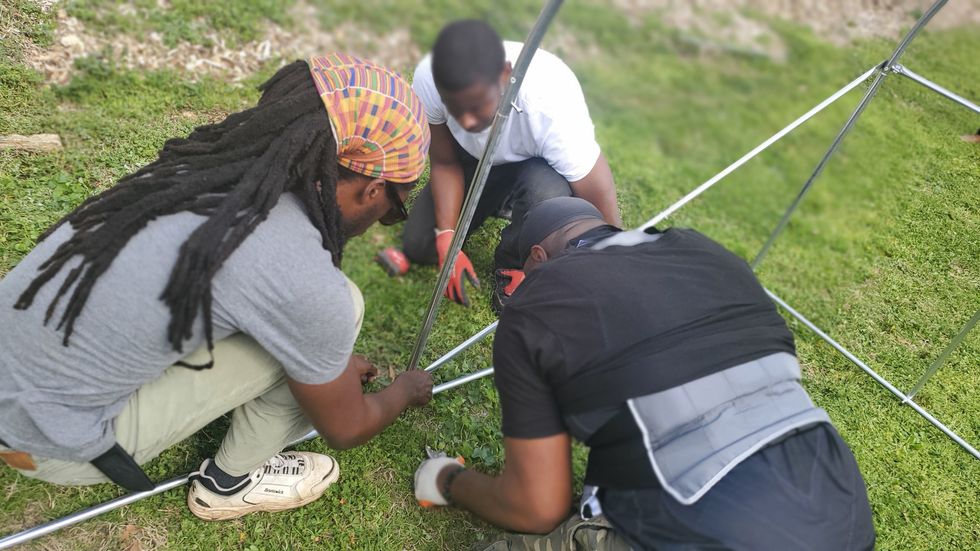
It was in the midst of this situation when 97-year-old Mother Clyde Robinson and Evangelist Sister DeBorah Williams founded the Mother Clyde Memorial West End Garden in August of 1994. Their goal was and still is to eradicate the neighborhood of an “urban blighted eyesore.”
The garden faced an uphill battle. Once the hurdle of funding was overcomed, the challenges of planting, watering, weeding and dealing with pests or disease came. Since it relies on volunteers, people may stop participating when life gets busy. Theft of plants, tools and even money and vandalism occurred. There was one solution: building a new sense of community.
The garden organizers held regular community meetings where they invited residents to share ideas, concerns and aspirations for the garden. These meetings allowed community members to participate in decision-making. Community members would share information about the garden’s mission, benefits and opportunities with their neighbors, which helped build trust and encouraged more people to get involved. By involving community members in the thinking of what the garden would be like in five, 10 or 20 years, people felt included and eager to learn and keep working toward those shared goals.
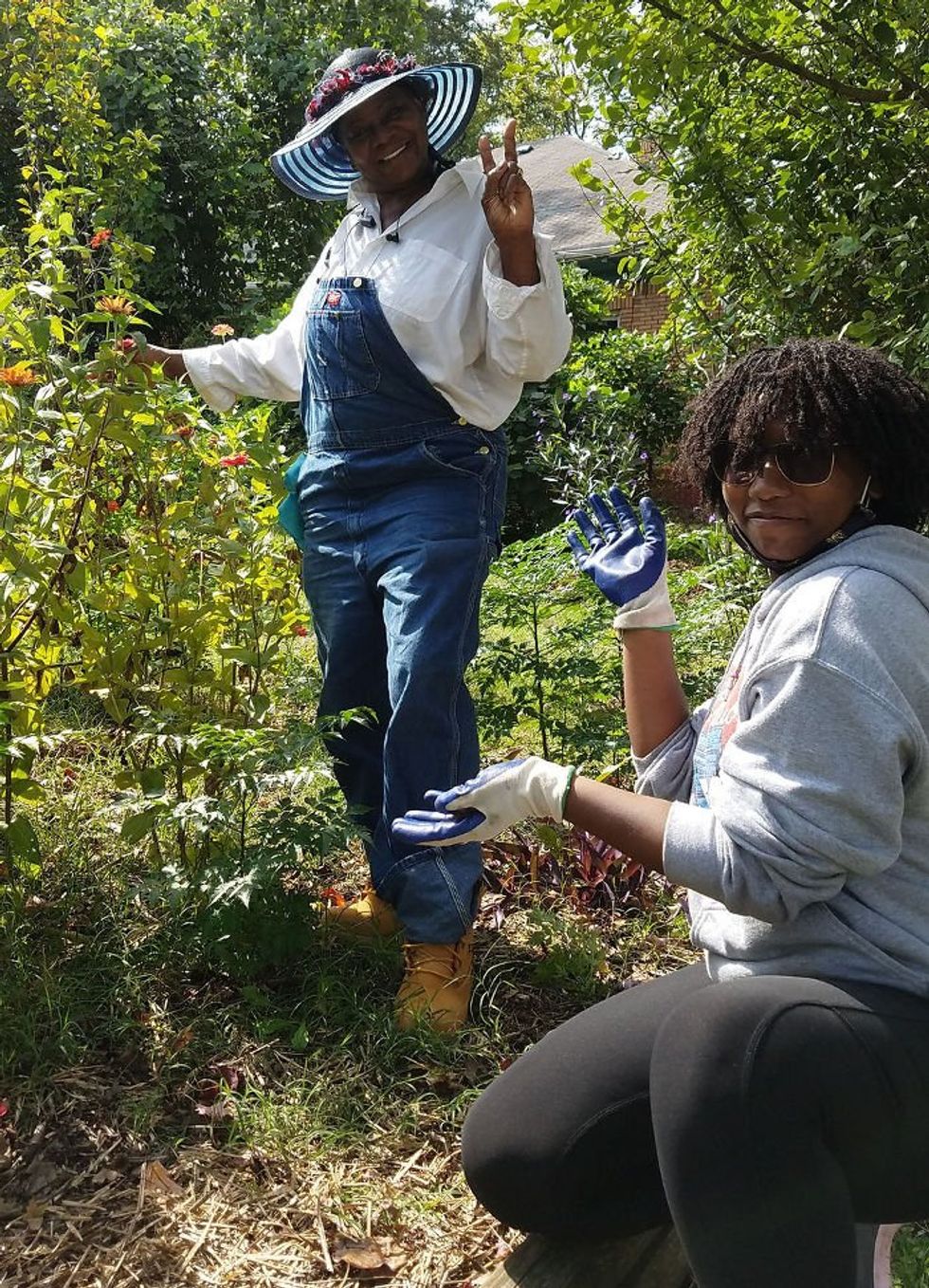
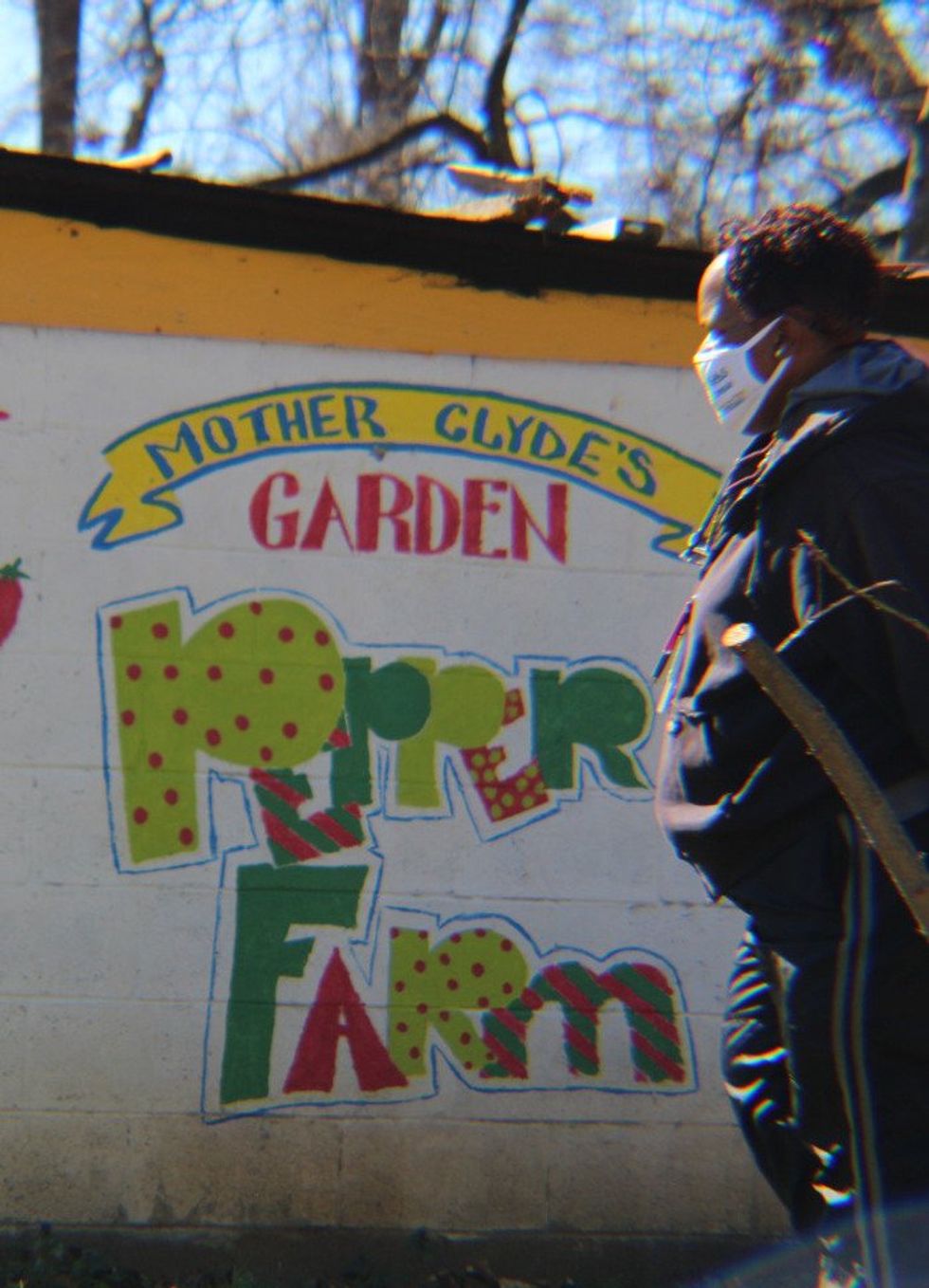
The garden also worked with neighborhood associations, schools and nonprofits in workshops and skill-sharing sessions. And with the understanding that youth play a vital role in shaping communities’ future, the garden engaged with nearby schools and universities. They organized field trips where students could visit the garden, learn about sustainable agriculture practices and participate in planting or harvesting. As a result, dozens of community members of Zone 4 Atlanta are creating this food oasis today. REDEEMED, the name of the non-profit managing the garden, provides “homegrown” fresh and healthy food choices to its community, sourced from two adopted parks; the Lucile-Holderness Park and Gordon White Park. Enough crops of mint, rosemary, peaches, apples, pears, squash, melons, peppers, among others, are produced every year to feed hundreds of people.
Our farm is owned and operated by the neighborhood’s senior citizens, with Sister DeBorah leading the charge. This comes from our belief that we should keep Afrocentric culture and traditions alive: in African communities, elders are viewed as the “transmitters of culture” and “guardians of the secrets of life.” Since 1995, our elders have been fostering the Redeeming our Youth program, where they teach kids from ages 5 to 18 gardening techniques, agribusiness and leadership skills.

But producing food is just the first step. We have training on canning and preserving, and community members sell hundreds of canned goods grown in the city at the West End Farmer’s Market ATL. Our long-term goal is to build a chef prep kitchen to train, involve and employ nearby residents in canning, bottling and preserving foods from the garden, while working with other community gardens in the area to establish a farmer’s market grocery store. We hope that a Kennesaw State University grant we recently received will help us build this dream kitchen.
After Mother Clyde’s passing in the late 90’s at 101, we are expanding her legacy with providing clothing to those in need, agricultural job training and housing for displaced women and abused mothers, alongside reintegration programs for ex-offenders.
Through my work at the farm, I am able to combine my passion for cooking, my understanding of farming practices from Nigeria and my commitment to improving access to nutritious food in urban environments. Whenever I’m teaching folks to cook simple stir-fries, seared seafood or mushrooms and construct flavorful salads, it feels like a full-circle moment.
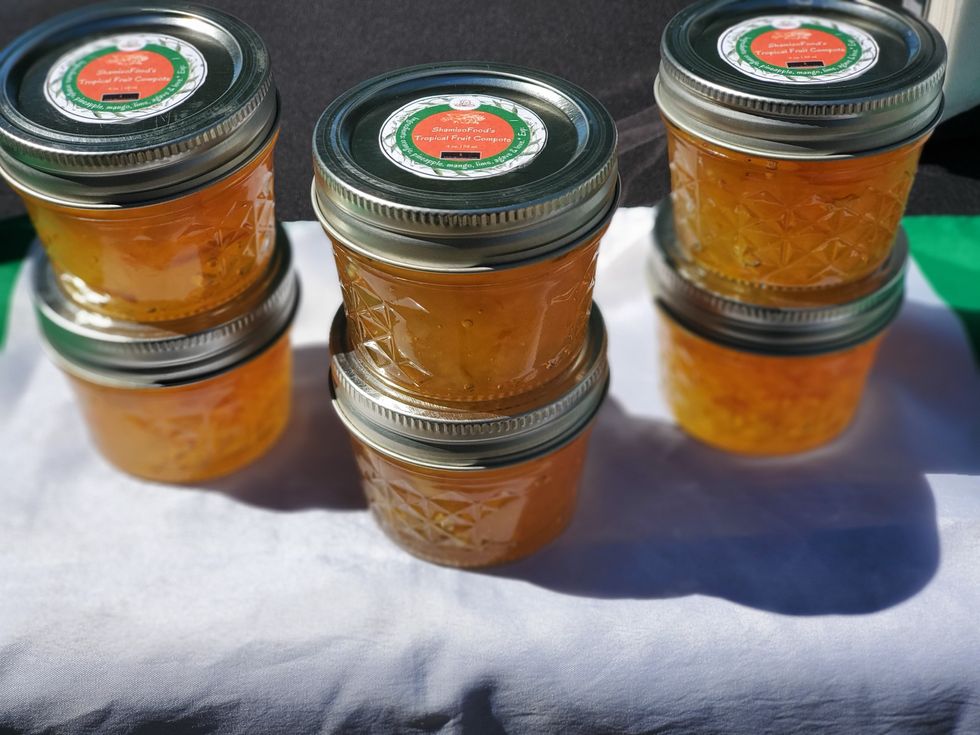
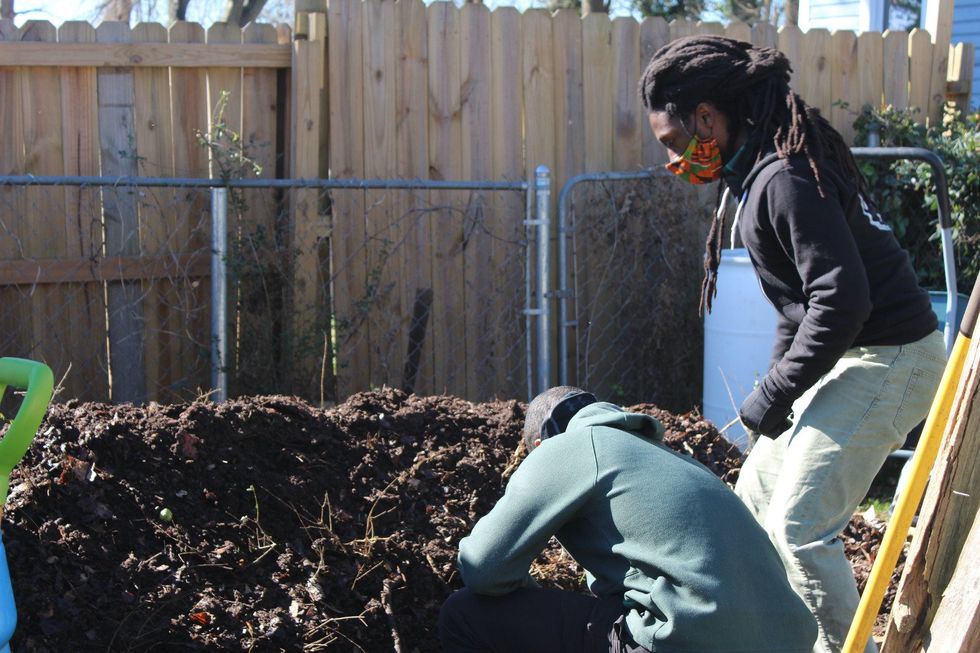
Who invited the cops to the cookout?
The culmination of Mother Clyde Urban Farm’s efforts is marked by an annual celebration held in one of West End Atlanta’s parks. This “National Crime Night Out” block party sees community residents enjoying produce harvested, prepared, cooked and consumed right on the garden’s grounds. Almost 250 people attended the West End block party last year. Yet, not too far off in the distance are the flickering blue and red lights of the Atlanta Police Department.
The tense relationship – which dates back to events like the Atlanta Race Riot/Massacre of 1906 – continues to be strained due to the recent controversial construction of the Atlanta Public Safety Training Center. Commonly known as ‘Cop City’, this facility is leaving some Atlanta citizens concerned as the area is surrounded by mostly Black residents who are at or below the poverty line. The project is seen as the continuation of an unjust treatment of Black, low-income communities in Atlanta, as it would destroy much of the tree canopy of the South River Forest, also known as the Weelaunee Forest, which will accelerate the urban heat island effect.
Just like it did for the Mother Clyde Urban Farm, improving the relationships between law enforcement and the community will take a village. Police officers have to acknowledge and address the long-lasting harm caused by their tactics and systemic racism and prejudice, while local and state agencies should work together to address underlying issues such as the criminal justice system’s relationship with poverty, improving our public education system, ensuring affordable housing options and enhancing transportation and infrastructure. In return, our community will be able to focus on our vital role in shaping the future of public safety.
I imagine a future where we will actively participate in decision-making processes regarding law enforcement practices, establishing community-led initiatives focused on conflict resolution and prevention. I imagine a neighborhood where community members talk to each other and with law enforcement to foster understanding, trust and accountability. In this future, funding social programs such as mental health resources, substance abuse treatment centers, youth development programs, job training opportunities, and community-based restorative justice initiatives is a priority.
I know this dream-like scenario is far away for communities nationwide that face the same income inequality and racial disparities abound within Zone 4. Nevertheless, I am honored and privileged to be a part of the Zone 4 “village.” I’ve seen what my village can do. Together we are changing where we work, play and live, making room for children like Ra-Ra to grow.

This essay was produced through the Agents of Change in Environmental Justice fellowship, a partnership between Environmental Health News and Columbia University’s Mailman School of Public Health. Agents of Change empowers emerging leaders from historically excluded backgrounds in science and academia to reimagine solutions for a just and healthy planet.





